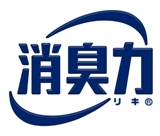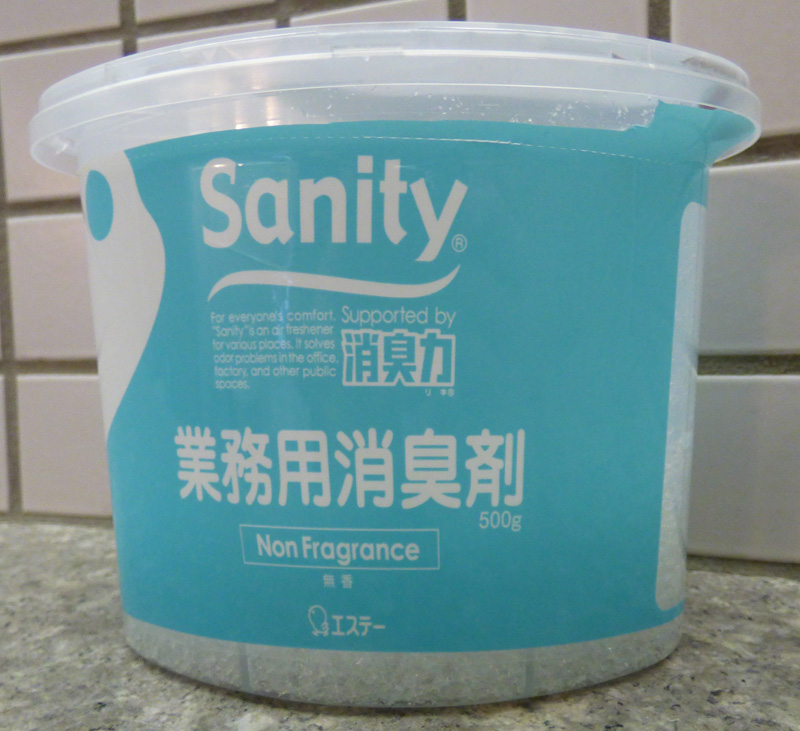Sanit(ar)y
« previous post | next post »
Nathan Hopson found this in a public bathroom at the Nagoya prefectural children's center last Monday:
The label reads:
gyōmuyō shōshūzai 業務用消臭剤 ("commercial deodorizer")
shōshūriki 消臭力 ("deodorizing power")
Notes:
1. I was surprised at some subtle differences of the Japanese kanji from both the simplified and traditional Chinese hanzi:
Simplified: yèwùyòng xiāochòujì 业务用消臭剂
Traditional: yèwùyòng xiāochòujì 業務用消臭劑
2. I wavered for a long time between reading 消臭力 as shōshūriki or shōshūryoku. I couldn't find a definitive entry in any of my dictionaries, so I asked some colleagues. The answers I received were, at least for me, nothing short of mind-boggling.
First colleague:
It should be shōshūryoku.
力 is read riki as you very well know, but they tend to be for traditional or idiomatic reading (I think – please don't quote me because I have no scholarly backing for this)
強力, 剛力, 業力 (are all go-riki), 大力 (dairiki or tairiki), 合力 (gouriki), 力士 (rikishi) — these are all words that had existed for centuries and probably the reading is Go-on 呉音(I am not sure, please don't quote me). But a noun such as 消臭力 is obviously a newly formed modern word. Modern reading for 力 is definitely ryoku.
Second colleague:
I think it's Shoshuriki. The official logo contains small katakata "リキ" to avoid confusion:

Official TV advertisement:
(This boy became famous through this version of the advertisement.)
https://youtu.be/nSBb4Maxj_E
https://youtu.be/7CJPpAJ0ZVI
Third colleague:
I think the difference is between
shōshūryoku しょうしゅうりょく = common noun
shōshūriki しょうしゅうりき = product name
The product page for Shōshūriki may be found here.
Dictionary entry for the brand name:
デジタル大辞泉プラスの解説
消 臭力 (shōshūriki しょうしゅうりき)
エステー株式会社が販売する消臭・芳香剤のブランド名。
"Brand name for deodorizing, fragrance products sold by S. T. Corporation."
The common noun dictionary entry is:
日本語活用形辞書
消 臭力
読み方:shōshūryoku しょうしゅうりょく
So, 消臭力 is pronounced shōshūryoku as a common noun and shōshūriki as a brand name, and don't you forget it!
Leaving behind these subtle, but oh so important, phonological nuances and returning to the name "Sanity" with which we began, Nathan quips: "With all those families packing the place, it was nice to get a dose of sanity."
Confusion between "sanity" and "sanitary" doesn't happen just for Japanese, since we find the same lapse in a Beijing baguette shop: "Sanity is the most important" (5/26/13).
[Thanks to Cecilia Segawa Seigle and Miki Morita]

Elonkareon said,
May 10, 2015 @ 1:27 am
Ah but is "sanity" actually a mistake in this case? It's an air freshener, not a sanitizer or cleaner of any sort. It hides displeasing odours to provide "comfort", and thus in a very small way preserve the mental peace (sanity) of those using that restroom.
maidhc said,
May 10, 2015 @ 3:17 am
We learning all about that in A Night at the Opera.
Jan Schreuder said,
May 10, 2015 @ 4:10 am
Ah yes. The Sanity Clause.
shima said,
May 10, 2015 @ 5:04 am
This is a pun.
長州力(Cho-shu-riki), the pro-wrestler
and
消臭力(Sho-shu-ryoku or Sho-shu-riki)
Jeff W said,
May 10, 2015 @ 5:30 am
The boy is Miguel Guerreiro, Portuguese and at the time 12 years old, according to this site. (The advertisement is filmed at Miradouro de São Pedro de Alcântara in Lisbon.) Following his Shōshūriki triumph, he’s recorded two albums entirely in Japanese, learning the songs phonetically. (Incidentally, the exuberant lead in the middle video, Takanori Nishikawa, is almost 30 years older than Miguel on his right and Maya Sakura on his left.)
Victor Mair said,
May 10, 2015 @ 6:44 am
@maidhc & Jan Schreuder
One has to listen to the very end of that video to get to the Sanity Clause, by which time one may have lost it.
Adam F said,
May 10, 2015 @ 7:11 am
…and the opposite is "unsanity".
Victor Mair said,
May 10, 2015 @ 8:43 am
Fourth colleague (a senior Japanese lecturer):
=====
In this kanji compound, I think Ryoku is the correct pronunciation. I have never heard of Riki.
=====
Together with everything else in the original post and comments, this underscores the fact that the normal, expected reading of 消臭力 would be shōshūryoku, but that the S. T. Corporation who market this line want you exceptionally to read it as shōshūriki, so that you'll be sure to remember it (and their products).
Incidentally, since their business is "Refreshing the Air", the company name "S. T." (esutē エステー) made me think of "Estée", but they claim otherwise:
=====
The "ST" of S.T. Corporation derives from a formulation of the first tenet of our management philosophy: our mission of giving our Service to society and earning society's Trust, and of creating Super Top products.
https://www.st-c.co.jp/english/company/corporate/information.html
=====
So "S.T." means both "Service Trust" and "Super Top"?
"S.T." seems about as transparent as "LG", the name of the Korean chaebol ("conglomerate"): "Lucky Goldstar", "Life's Good".
http://en.wikipedia.org/wiki/LG_Corporation
http://www.brighthub.com/mobile/lg/articles/83672.aspx
S.T. Corporation's main business is in deodorizers and air fresheners, and so far they seem to have resisted the lure of adding fragrances to their products (cf. the "Non Fragrance" on the label in the photograph at the top of this post), but they're thinking about it:
=====
Currently, we are proposing high quality fragrance that meets the needs of those customers who wish to enjoy a pleasant scent and aroma.
https://www.st-c.co.jp/english/company/about/ourbusiness.html
=====
Victor Mair said,
May 10, 2015 @ 12:57 pm
Fifth colleague (senior lecturer of Japanese):
=====
消臭力 is usually read as shōshūryoku. I googled it and found that there is a merchandise called "shooshuuriki" using the kanji 消臭力。it erases the odor of the trash box/garbage can. You can see the commercial of the product of shooshuuriki at
https://www.youtube.com/watch?v=Njz9e_lwH9U
But a general term, meaning " the power to erase the odor" is shōshūryoku.
=====
Victor Mair said,
May 10, 2015 @ 1:14 pm
Jeff W notes that Miguel Guerreiro, "Following his Shōshūriki triumph, … recorded two albums entirely in Japanese, learning the songs phonetically."
In terms of language learning, that's a significant statement, especially since Miguel's Japanese sounds so natural.
Cf. the recent discussion about the Mandarin fluency of Jessica Beinecke here:
"OMG! American English" (5/1/15)
http://languagelog.ldc.upenn.edu/nll/?p=18825
Victor Mair said,
May 10, 2015 @ 1:56 pm
As I marvelled at Miguel's prowess in Japanese, and the dramatic Lisbon backdrop against which he belted out his most famous Shōshūriki ad, it all seemed entirely fitting to me, since the Portuguese were the first Europeans to have active diplomatic and commercial relations with Japan, and they founded the port of Nagasaki (recall our previous posts about early Portuguese borrowings into Japanese).
http://en.wikipedia.org/wiki/Japan%E2%80%93Portugal_relations
Victor Mair said,
May 10, 2015 @ 2:38 pm
From a friend:
=====
Let's not even think about whether there are "sanity napkins".
=====
Jeff W said,
May 10, 2015 @ 3:13 pm
For readers who haven’t quite caught the underlying nuances in the commercial, this article “Message Of Hope Hidden In Toilet Deodorizer Commercial” gives a bit more background and a translation of the rather catchy lyric.
Well, I’m hardly the Japanese toilet deodorizer maven but I had the impression that the lemon, lime, and grapefruit slices wafting out of the window that Miguel opens, at about 2 seconds into the middle video, might indicate some kind of fragrance. (And there is or was, apparently, among other scents, grapefruit, peach, lavender, “clear forest” and camomile available, which goes a long way toward explaining the ebullience of Guerreiro, Nishikawa, and Sakura that a purely non-fragrance line of deodorizing products would otherwise make inexplicable.)
Jeff W said,
May 10, 2015 @ 10:56 pm
Well, I’m not obsessed with Shōshūriki (yeah, right!) but the last segment of this video sort of completes the “trilogy”: Miguel Guerreiro, Takanori Nishikawa, and (this time) Hitomi Shimatani return to where it all began (!) and Takanori and Hitomi speak a few words of Portuguese—which serves as a good enough pretext for my posting this comment, I guess—before reprising Miguel’s signature song. (The other segments feature the three singing their 2012 hit 「チカラにかえて」, frolicking about Lisbon on the #550 Carris streetcar, and chatting raptly—about air fresheners, one suspects, because these are, after all, Shōshūriki commercials. All quite good fun.)
And just for completeness (and to assure that this is my absolutely last comment on this post) here is a younger Miguel Guerreiro from 2008, who managed to win, without uttering a syllable of Japanese, first prize on Uma Canção para Ti, a Portuguese TV show featuring young talents; and here is one of his Japanese ventures, singing 「マル・マル・モリ・モリ!」 with Fuku Sukuzi (which doesn’t work as well as the preternaturally cute version with just Sukuzi and Mana Ashida).
dainichi said,
May 11, 2015 @ 7:42 am
What I've heard of Miguel's Japanese is good. If I had to pick something, I would say that his rounded /u/s (Japanese /u/s are unrounded and compressed) and [ʃ]-like [ɕ]s (sh in shōshū) give him away.
AG said,
May 13, 2015 @ 2:54 am
(I'm sure everyone here already knows this, but I can't resist spelling out these connections -) The "riki" pronunciation is hidden in "rickshaw".
NickM said,
May 17, 2015 @ 7:17 am
What would "commercial" mean — in this context — in American English? I think it would sound unnatural and redundant in British English — because, if it meant anything, it would mean something like "for sale to the general public". Which would be almost the opposite of "for use by professionals", or "for business/industrial use".
Is there any satisfactory translation of 業務用 (gyoumuyou)? I couldn't find one when I looked up Swarfega, a venerable British 業務用 hand-cleaner that I remember from student jobs on building sites.
NickM said,
May 17, 2015 @ 7:29 am
BTW, I'm fairly sure I remember 業務用 being used as a jokey synonym for "gross" or "oversized", as in "He ate a gyoumuyou-sized bowl of ramen".
Florence Artur said,
May 17, 2015 @ 12:04 pm
At the end of the second video I finally got it: エステ means ST and not, as I thought all these years, esthé (which could be short for French esthétique although I have to admit it probably doesn't make much sense).